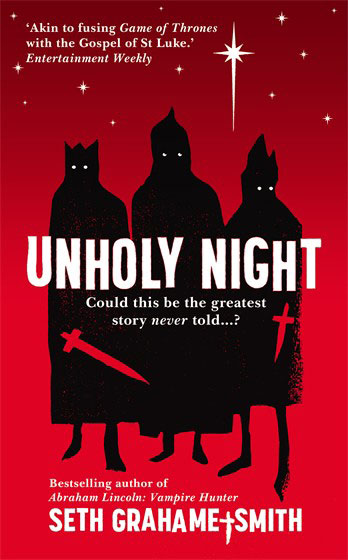 Unholy Night by Seth Grahame-Smith (Bantam)
Unholy Night by Seth Grahame-Smith (Bantam)
“When the legend becomes fact, print the legend,” said the journalist in The Man Who Shot Liberty Valance, a famous quote that holds true for the New Testament among many other texts. In Seth Grahame-Smith’s Unholy Night, the legend is that three kings visited Joseph and Mary in a Bethlehem barn upon the birth of their son Jesus, and the “fact” is the matter of the book.
Seth Grahame-Smith, who has emerged as one of the most popular American cultural entertainers of the last few years, specialises in counter-intuitive counterfactuals. His Pride and Prejudice and Zombies does what it says on the tin, as does Abraham Lincoln, Vampire Hunter, wherein the great man becomes an abolitionist after seeing slaves sold to the thirsty undead as livestock. Unholy Night continues the author’s affair with the off-kilter high-concept. What if those three kings weren’t kings at all?
“Balthazar had to admit, Herod’s dungeons were among the nicest he’d seen. The sand-coloured walls and floors were smooth and dry, and at ten feet by ten feet, the cells were on the larger side. But the real attention-getting amenities were the small, iron-barred windows on the east-facing walls of each cell. Windows … in a dungeon. What a world this is.”
There’s no theological mischief afoot. The counterfactual extends only to the identities of the three kings, and the introduction of some spooky magicians from pre-Christian days. Anyone looking for a swingeing rationalist treatment of the early days of Jesus will be very disappointed, because the tone is entirely respectful to the religion.
The book could in fact be handily racked with all those weird Christian Right post-Rapture novels without anyone feeling the need to pull a gun. It’s not like there was a great deal in the original text about the three kings to be argued with. And these three kings have more in common with the light-fingered soldiers of the George Clooney film than any local royalty.
They are, in fact, three thieves locked up in a dungeon together by Herod: Gaspar, Melchyor and the protagonist of the book, Balthazar. Feted as the legendary “Antioch Ghost”, Balthazar is as rakishly charming a thief as the period can provide, a ragged Raffles who never saw a bad choice he didn’t prefer. Performing a jailbreak and making a run for it, wearing the robes of priests they’d pulled a lethally dirty trick on, the three men collide with Joseph, Mary and child just as Herod decrees the baby be found and put to death. Herod, demented client king of Judaea, is herein a diseased blimp of a man, driven mad by both power and the lack of it. A broadly drawn grotesque, but no less entertaining for it. Balthazar, driven to thwart Herod in all things and equally amusing as the soiled hero of the piece, determines to get the family to Egypt and safety.
And therein hangs the yarn. And make no mistake, this is a Ripping Yarn. Grahame-Smith has already sold it to Warner Brothers, and will be writing the screenplay himself. It’s a perfectly well-cut and solid three-act yarn with reversals and redemption and action and even a love story. The important thing to remember is that this is clearly precisely what the author was going for, no more and no less, and so the book should be judged solely on that basis. The man hasn’t sat down to present a fascinating historical argument or a piece of philosophical insight. He’s here to put bums on seats.
The great surprise, for me, was that Grahame-Smith knows his way around a sentence. He’s an actual craftsman, unshowy but capable of an elegant turn of phrase when it suits the moment. For a writer working with a fairly goofy high-concept, he produces a propulsive prose, free of fat or infelicity, without falling prey to the thudding character-free plod of an airport-rack thriller.
A Ripping Yarn, well told, is no bad thing. It’s almost a lost art, in fact. If you don’t expect more from Unholy Night than you did from Raiders of the Lost Ark, you might even enjoy it.

